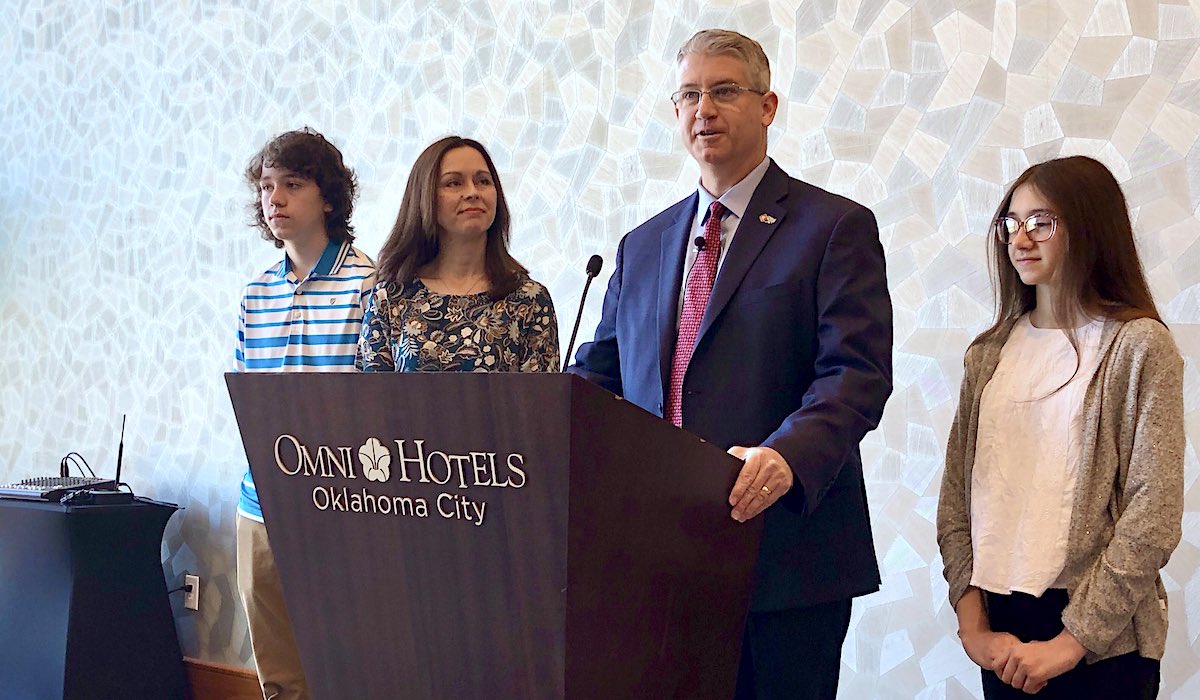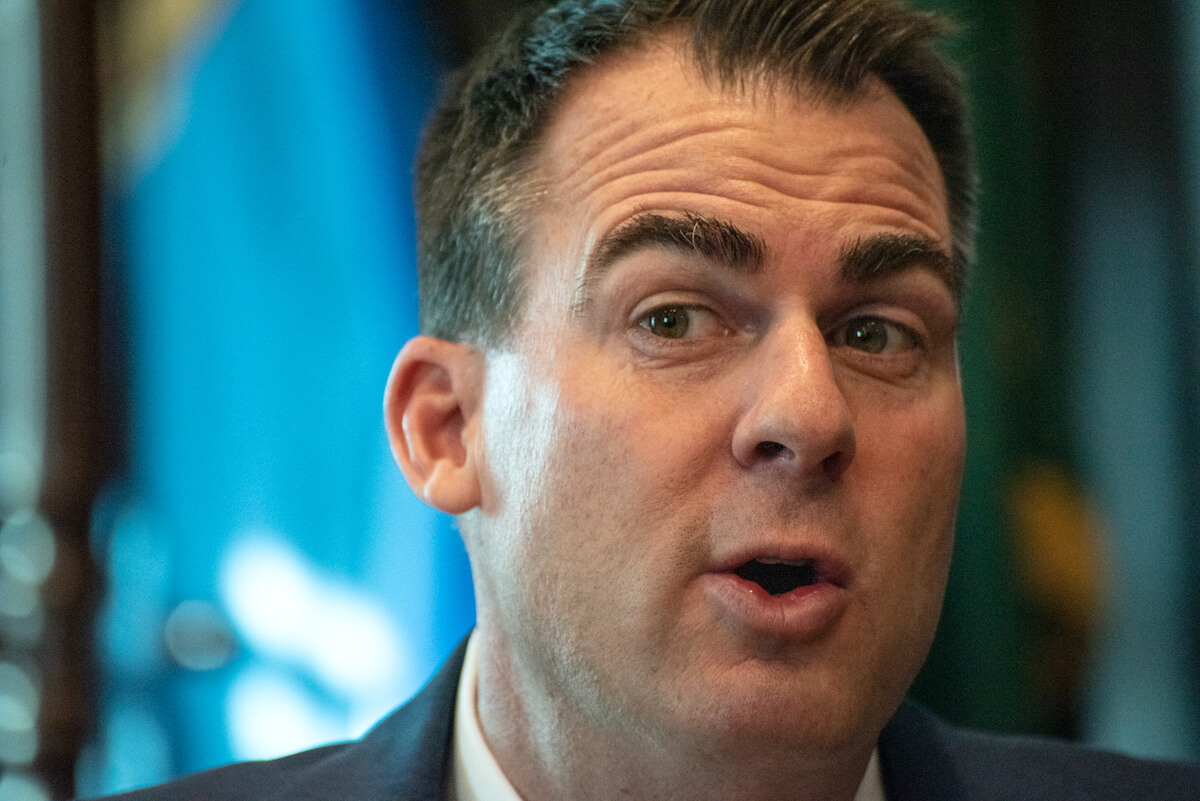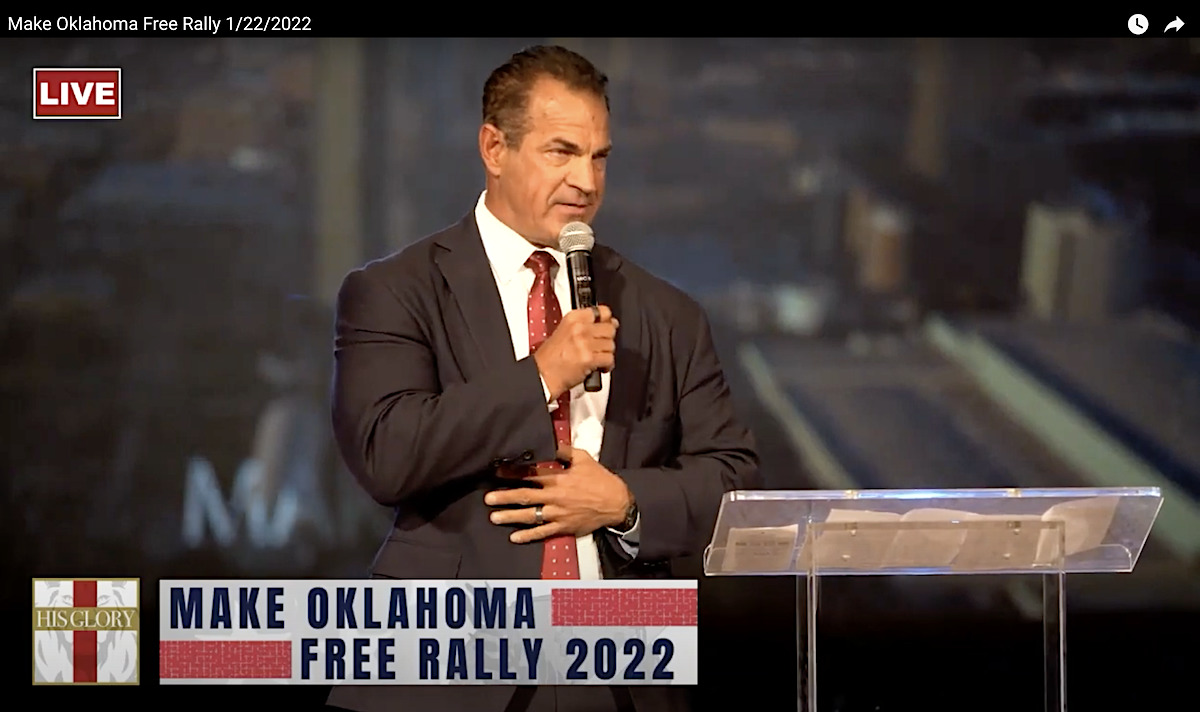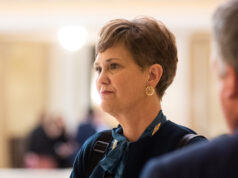

(Update: On Tuesday, June 28, Gov. Kevin Stitt won the Republican gubernatorial primary.)
As Gov. Kevin Stitt seeks a second term, he faces three Republican challengers in the June 28 primary: Joel Kintsel, who says Stitt’s administration lacks transparency and integrity; Mark Sherwood, who faults the incumbent for being insufficiently conservative; and Moira McCabe, who wants to “audit the dog shit out of everything” that has happened on his watch.
Stitt’s time in office has been marked by a number of significant developments in state and national politics, including the U.S. Supreme Court’s decision in McGirt v. Oklahoma, which led to half of the state being recognized as tribal reservation land, and last week’s Supreme Court’s decision overturning Roe v. Wade, which triggered a number of abortion restrictions in Oklahoma to go into effect and opened the door for the passage of further legislation.
Ahead of Tuesday’s GOP gubernatorial primary, the four Republican candidates spoke with NonDoc about their reasons for running and their priorities if elected governor.
If no one candidate wins more than 50 percent of the vote on Tuesday, the top two finishers will head to runoff on Aug. 23. In November, the winner of the Republican primary will face the winner of the Democratic primary, along with Libertarian candidate Natalie Bruno and former Sen. Ervin Yen, who is running as an independent.
A colorful cast of candidates

Before winning the governorship in 2018, Stitt was the founder and CEO of Gateway Mortgage, and he has made a point of bringing his private sector approach to the government.
Now, seeking reelection, Stitt says the main difference he has found between the public and private sectors is the slower pace that comes with working with the Legislature and various interest groups.
“Collectively, it’s super hard to, you know, move the needle, and I’m wanting to bring technology in and change the way we’ve done [things],” Stitt said. “Whatever the industry you’re talking about, when you start to change things up, sometimes they try to, you know, stop that momentum.”
Still, Stitt said he still considers it “a no-brainer that you have to elect people that have been in the private sector that know how to run a business.”
Joel Kintsel, who is currently taking leave as executive director of the Oklahoma Department of Veterans Affairs to challenge the governor, is the only other GOP candidate with experience working in government.
Before going to the ODVA, Kintsel spent 12 years as the parliamentarian for the Oklahoma House of Representatives. He also is an Army veteran who served in Iraq.
“I have deep experience in state government,” Kintsel said. “I’m an expert in the legislative process (…). I’m very familiar with our constitutional paradigm. I also, because of my military background, have a lot of leadership experience.”
Kintsel characterizes his leadership style as “investing in the success of others and putting the needs of Oklahomans first, rather than your own.”
Mark Sherwood is a naturopathic health practitioner who runs the Functional Medicine Institute, an alternative-medicine center in Tulsa, with his wife. He previously spent 24 years on the Tulsa police force. As a child, he was bullied for his weight, but he went on to play professional baseball in Australia and developed a career as a professional bodybuilder. He spent 10 years touring with the Power Team, a Christian bodybuilding group that performs shows combining evangelism and feats of strength.
In 2006, Sherwood was arrested on assault charges. He told the website MAGA Institute in October that the charges were fabricated by his ex-wife and withdrawn.
This marks Sherwood’s first time running for office, and one of his campaign slogans is, “When tyranny becomes law, rebellion becomes duty.”
“When I looked back at what was happening starting in 2020, I saw a big chasm in regard to leadership,” he said of his decision to run. “I couldn’t find anyone who would step up for the right principles.”
Sherwood said he prayed and consulted with his wife, and it became clear, he said, “that my life was set up for such a time as this.”
McCabe is, by her own admission, perhaps the most unconventional candidate in the group. For one thing, she describes herself as poor and used her tax refund to pay the $2,000 fee to run for governor. She has a small following on TikTok, where she posts videos on politics, COVID-related conspiracy theories and even home-improvement projects. When she can, she also spends time cleaning and repairing damaged headstones in the cemetery where her parents are buried.
McCabe said she doesn’t expect to finish in the top two in the primary and, if she does, she will assume it’s because Stitt’s people have orchestrated it so that he wouldn’t have to run against a stronger opponent.
“So, if I win, I’m going to demand an audit,” she said.
Asked why she’s still running, McCabe had a simple answer.
“I want to inspire more people who are poor to try to get in there, you know, and a few people are happy that a regular person like them is trying to take this on,” she said. “And so even if I end up laying across the barbed wires, they can maybe get past and get in and make a difference.”
She added, “A lot of these politicians think God has sent them to do this, and I’m like, ‘Gonna be awkward if you don’t win.’”
Calls for transparency

Over the past four years, Stitt has made changes to the nature of the governor’s office, accruing powers to the executive branch, particularly in the ability to hire and fire within state government, and he hasn’t hesitated to exercise those powers. Republicans in the Legislature enthusiastically granted Stitt these powers at the beginning of his term, but some have recently expressed second thoughts about having a stronger executive branch.
Senate Appropriations and Budget Committee Chairman Roger Thompson announced in June that he was drafting legislation to restore the powers of the Oklahoma Tourism and Recreation Commission as details unfolded about alleged corruption and mismanagement of the Tourism and Recreation Department under Stitt appointee Jerry Winchester, who resigned in June. (That law was changed in 2018 before Stitt became governor, but Stitt’s decision to hire Winchester and the agency’s ultimate performance have motivated Thompson to try and reverse course.)
Accusations of self-dealing and secrecy by the governor are a common theme of other candidates on the campaign trail.
This issue is at the forefront for Kintsel, who has accused the Stitt administration of using the state’s IT service to try to spy on his campaign. The Oklahoma Office of Management and Enterprise Services reported that an investigation found no evidence of “malicious activity,” but Kintsel said he believes there is “all kinds of malfeasance” at OMES that “hasn’t come to light yet.”
Kintsel said he was motivated to run by “the massive amount of corruption and cronyism that seems to surround the governor and his direct appointees.” He pointed to the Tourism Department scandal and millions the state spent during the pandemic on PPE that never arrived.
As head of the ODVA, Kintsel said he has seen “the corruption and mismanagement” of the administration “from the inside.”
Stitt, however, stands by the way he has run his administration. He said holding people accountable is important, but that’s a matter of auditing, not of how power is structured in state government.
“I cannot imagine going through COVID [without the power to appoint agency heads] — if I would not have had the authority to work closely with the Department of Health, for example,” he said. “Fortunately, I am able to appoint that person. We can be aligned. I could put my values, we can be talking, we’re on the same page, instead of basically having, you know, 150 different governors based on different positions.”
As proof of his commitment to transparency, Stitt points to audits his administration has requested of various government agencies, including the State Department of Education. (Democratic challenger and Superintendent of Public Education Joy Hofmeister described that audit as an “attack” on public education.) Stitt also references a move to put data about the state’s finances online.
Sherwood, for his part, has signed a pledge promoted by the group Clean Up Oklahoma that calls on candidates to support a number of transparency measures.
McCabe has also signed the Clean Up Oklahoma pledge and generally finds it hard to fathom why corruption occurs in the first place.
“If I was governor, I’d be making $147,000 a year,” she said. “Why would I need to take kickbacks from anybody? If you can’t live on that, you need to reevaluate your shit.”
The impact of McGirt

Stitt has been adamant about opposing the McGirt decision since the Supreme Court ruled on the case, in 2020. Over the past year, his administration filed dozens on legal challenges to the decision and (unsuccessfully) asked the Supreme Court to consider overturning the ruling entirely.
This pushback has led to significant tension with Oklahoma’s tribal nations and has drawn criticism from several members of his own party.
His gubernatorial opponents have almost unanimously criticized his approach to the issue as well.
“What we have right now is not working. It’s completely severed,” Sherwood said. “And instead of, as I’ve said, drawing a line in the sand with the tribes, we need to get in the sand and build a sand castle. We need to begin to do things different. Oklahoma is an Indian state. It is.”
Kintsel said Stitt’s management of the state’s relationship with the tribes was the other main reason he decided to run.
“I view Oklahomans as a family, and it really really bothers me to see the governor targeting and antagonizing our tribal leaders,” he said, adding that he finds it “absurd” the governor hasn’t pursued jurisdictional compacts with the tribes.
Stitt said he is “trying to make people aware” of the wide ramifications of the reservation designation expanding beyond the criminal jurisdiction specifically addressed in the McGirt case. He points to states such as Arizona and North and South Dakota, which have long-established reservations where tribes have total jurisdiction.
“[The tribes are] a special interest group and, of course, I don’t begrudge them for fighting,” Stitt said. “Their leadership is fighting for more control and more revenue, and more money and more control. But as the governor of the state of Oklahoma, I’m not going to just rubber-stamp and cede our authority as a state to six different jurisdictions in the eastern part of Oklahoma.”
An abortion debate within the GOP gubernatorial primary

With the recent repeal of Roe v. Wade, abortion promises to be an even bigger issue than usual in the 2022 election cycle.
Stitt has often said he wants to make Oklahoma the most pro-life state in the country and has promised to sign “every piece of pro-life legislation that comes across my desk.” This year, such legislation included a bill banning abortion from the point of fertilization and one making it a felony to perform an abortion unless it is necessary to save the mother’s life.
Sherwood, however, thinks the recent legislation doesn’t go far enough. Like a small but growing contingent of Oklahoma legislators, he would like to see the procedure banned entirely, with no exceptions, and for the law to allow both the abortion provider and the mother to be charged with murder.
He points to his own life experience as the basis of his stance on the issue: His mother was 16 when she got pregnant and gave him up for adoption. He said he considers her “a hero” for not terminating the pregnancy.
“Everybody knows it’s still going to happen,” he acknowledged, “but we don’t need to make it permissible.”
Asked if he would sign Sherwood’s desired legislation if the Legislature sent it to him, Stitt said, “I don’t think they would put something like that on my desk.”
He added, “I would just have to see what it is and what it looks like. And if it protects life, we want to do that, but we’re not pointing any fingers at women.”
Kintsel wrote in a Facebook post in May that he believes life begins at conception and was praying for Roe v. Wade to be overturned.
McCable lists being “pro-life” at the top of her platform, though the solution she advocates for is “helping make birth control more available to anyone who needs it.”
“I’m against the idea of abortion,” she said. “I hate the idea of it. (…) Being able to prevent a pregnancy is a super important thing. And I think everyone should have access to that. And if they think that people who are homeless or, you know, poor or impoverished, don’t deserve the same, that they’re not capable of the same love and needing of affection and coupling or whatever you want to call it as anyone else — that’s ridiculous.”
The path to the governor’s office
Kintsel said he is running for governor simply because he wants to see better leadership in the state.
“The fact of the matter is, there’s not a lot of difference ideologically between myself and Kevin Stitt,” he said. “It’s just my approach to government is one of being ethical and putting the interests of the people of Oklahoma first.”
RELATED
Hofmeister, Johnson believe a Democrat can be Oklahoma’s next governor by Andrea DenHoed
Other items on his platform include “empowering” energy companies in the state, improving education and ending federal mandates.
Sherwood’s other priorities include deregulation, preventing unvetted refugees from entering the state, and ensuring “corrupt ideologies such as critical race theory” are not taught in schools.
As Stitt reflects on his first term and envisions a potential second one, he said he emphasizes his goals to improve Oklahoma’s infrastructure and bring more companies to the state.
“I’ve done it for four years now,” he said. “I think people can see exactly who Gov. Stitt is and how I would make decisions and how I’m not afraid to stand up for our way of life and protect us.”
McCabe, meanwhile, finds it hard to share her opponents’ nonchalant confidence in their ability to lead the state.
“How can you be going for a job that you’re responsible for 4 million people and you don’t look the least bit worried or nervous?” she said. “Either you’re not gonna really make a difference, or you really don’t understand the gravity of what you’re trying to go for here. That’s 4 million different people, different religions, different walks of life, hopes, fears, dreams, concerns. That scares the crap out of me. It does. That means I take it seriously.”





















